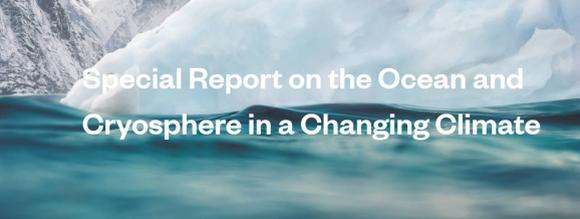 A disturbing new report by the U.N. Intergovernmental Panel on Climate Change concludes that the rate at which the world’s oceans are heating up is accelerating and that sea levels are rising more quickly than previous predictions. The Special Report on the Ocean and Cryosphere in a Changing Climate notes that “the ocean is warmer, more acidic and less productive. Melting glaciers and ice sheets are causing sea level rise, and coastal extreme events are becoming more severe.”
A disturbing new report by the U.N. Intergovernmental Panel on Climate Change concludes that the rate at which the world’s oceans are heating up is accelerating and that sea levels are rising more quickly than previous predictions. The Special Report on the Ocean and Cryosphere in a Changing Climate notes that “the ocean is warmer, more acidic and less productive. Melting glaciers and ice sheets are causing sea level rise, and coastal extreme events are becoming more severe.”
NPR reports that the report is a synthesis of the most up-to-date climate science on oceans and ice, and it lays out a stark reality: Ocean surface temperatures have been warming steadily since 1970, and for the past 25 years or so, they’ve been warming twice as fast.
Sea levels are also rising increasingly quickly “due to increasing rates of ice loss from the Greenland and Antarctic ice sheets,” the report states.
“For me, it’s the complete picture that’s kind of surprising and, frankly, concerning,” says Ko Barrett, vice-chair of the U.N. panel and the deputy assistant administrator for research at the National Oceanic and Atmospheric Administration in the U.S. “This is, in some ways, a report about water. Water is the lifeblood of the planet.”
The report also discusses a relatively new phenomenon in the oceans: marine heat waves.
“It’s sort of remarkable that prior to 2012 [or] 2013, nobody had thought about heat waves in the ocean,” says Andrew Pershing, chief scientific officer at the Gulf of Maine Research Institute in Portland, Maine. “And then, in 2012 we had a huge event here in the Northwest Atlantic, and the Gulf of Maine was right at the center of it. It was a real surprise.”
In 2014, an ocean heat wave in the Pacific was dubbed “the Blob,” which persisted into 2016 and resulted in depressed salmon runs, sea lion starvation and high temperatures on land across the Pacific Northwest.
Recently a new Pacific Ocean heat wave has reformed. NOAA reports a new expanse of unusually warm water has quickly grown in much the same way, in the same area, to almost the same size to ” the Blob.”
The warm expanse building off the West Coast stretches roughly from Alaska south to California. It ranks as the second largest marine heatwave in terms of area in the northern Pacific Ocean in the last 40 years, after “the Blob.”
“It’s on a trajectory to be as strong as the prior event,” said Andrew Leising, a research scientist at NOAA Fisheries’ Southwest Fisheries Science Center in La Jolla, California. He developed a system for tracking and measuring heatwaves in the Pacific Ocean using satellite data. “Already, on its own, it is one of the most significant events that we’ve seen.”
Among other issues, there are serious concerns that Hawaii’s coral reefs may be threatened by the Pacific heat wave.

Get everyone to go electric vehicles for free. Get companies to stop being greedy. Get it so winters will keep people warm in the winters where some of us live in the cold with out burning fossil fuels. Sound like a fantasy? That is because it is. Good luck on stopping global warming. As it just wont happen.
Willy, before fossil fuels were operationalized the idea of traveling across the oceans without sails certainly fit the definition of a fantasy. Then we made it real.
Ideally we’d be a little more forward-thinking because then (quite apart from climate change) we’d have employed fossil fuels as a really terrific stepping stone, given that there’s a limited supply of fossil fuel to use. Argue over a 200 year supply or a more optimistic 1,000 years of exploitable fossil fuels; whatever the case we’re going to need a replacement. But as a species we tend not to think more than a few years ahead, let alone more than a lifespan.
What really we have here is failure of imagination, I think.
Also last time I checked vehicles powered by internal combustin engines (the Victorian-technology “farting thrashers” still so popular today) cost money. They’re not actually free.